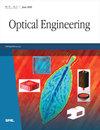水下无线光信道模型的实验研究
IF 1.2
4区 工程技术
Q4 OPTICS
引用次数: 0
摘要
摘要激光束在水下环境中传播时会产生吸收和散射引起的衰减以及湍流引起的衰减。这些效应导致光功率下降和光强度波动。为了考虑通信链路中水流速度、流向和距离的变化,在河流和海洋近岸水域进行了实地测量。根据这些测量结果,建立了一个水下无线光信道模型。我们的研究包括测量和分析不同水下区域的光强波动、接收光功率损耗和结构常数。此外,研究还探讨了误码率随不同信噪比的变化。结果表明,在特定情况下,河流显示出低湍流属性,而海洋近岸水域则显示出中等程度的湍流。随着水流速度的增加,接收到的光信号的闪烁指数也随之增加,这表明信号的不稳定性更高。水平发射时,接收光信号的闪烁指数不受水流方向的影响。此外,随着发射器和接收器之间距离的增加,接收到的光信号的闪烁指数也会增加,这表明信号的不稳定性程度更高。外部干扰因素的存在会增加湍流强度。在水下 60 厘米的深度范围内,不同深度的湍流强度基本保持不变。本文章由计算机程序翻译,如有差异,请以英文原文为准。
Experimental study of underwater wireless optical channel model
Abstract. The propagation of a laser beam in an underwater environment gives rise to attenuation caused by absorption and scattering as well as fading caused by turbulence. These effects lead to a decrease in light power and fluctuations in light intensity. To account for variations in water velocity, flow direction, and distance in communication links, field measurements were conducted in rivers and ocean nearshore waters. Based on these measurements, a model for an underwater wireless optical channel was developed. Our study involves the measurement and analysis of light intensity fluctuation, loss of received light power, and the structure constant in various underwater regions. Additionally, the investigation examines the variation of the bit-error rate in relation to different signal-to-noise ratios. The results suggest that the river displays attributes of low turbulence, whereas the ocean’s nearshore waters exhibit a moderate level of turbulence under the specified circumstances. As the velocity of the water increases, the scintillation index of the received optical signal also increases, indicating a higher degree of signal instability. When transmitting horizontally, the scintillation index of the received optical signal remains unaffected by the direction of water flow. Furthermore, as the distance between the transmitter and receiver increases, the scintillation index of the received optical signal intensifies, indicating a greater level of signal instability. The presence of the external interference factors can increase turbulence intensity. Within a depth range of 60 cm underwater, the turbulence intensity at different depths remains basically unchanged.
求助全文
通过发布文献求助,成功后即可免费获取论文全文。
去求助
来源期刊

Optical Engineering
工程技术-光学
CiteScore
2.70
自引率
7.70%
发文量
393
审稿时长
2.6 months
期刊介绍:
Optical Engineering publishes peer-reviewed papers reporting on research and development in optical science and engineering and the practical applications of known optical science, engineering, and technology.
 求助内容:
求助内容: 应助结果提醒方式:
应助结果提醒方式:


